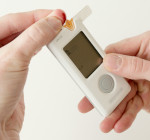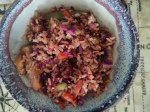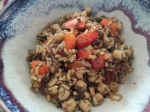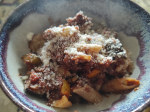A lot of T2 diabetics are focused on their blood glucose levels. They monitor it and they want medication that will make it go down. But that’s the wrong thing to focus on. Kinda. Blood glucose is a side effect of what the problem really is. High blood glucose, i.e.…
Category: Glycemia
Progress: 1 year anniversary
This is the first year anniversary of my diabetes diagnosis. To celebrate, I had a quarterly blood test done this morning. The results are in: fasting sugar 86mg/dl, HbA1c 5.4% (down from 5.44% the last time). So, everything is still good, post-diabetes is sticking as expected. Below is a graph…
Day to day: rice
The one thing that I’m still not entirely happy eating is rice. Pasta, wheat, and everything else doesn’t spike me much anymore. But rice keeps my blood sugar high for a long time. For example, the other night I ate a big bowl of rice and vegetables with breaded “chicken”…
Basics: the “clean” diet
I saw someone recently complain that they had a “clean diet” but after meals they felt bad and nauseous. It’s surprising because for a diabetic, it’s usually when you eat badly that you feel bad, not when you have a “clean” meal. So after asking what the “clean diet” was,…
Tip: lower your blood glucose from your chair
So you’re working hard at controlling and lowering your glycaemia. You usually do exercise after each meal as a way to spend the glucose you eat and lose weight. But sometimes, especially at work, you can’t just leave your desk and go for a 20 minutes walk. So what can…
Basics: diabetes and stress
So you’ve switched your diet to a proper human diet with low carb, you do your daily exercise, and you were hoping your blood glucose levels would go down fast. But they seem to resist and stay up. One other factor in onset of diabetes and then high glycaemia is…
Day to day: pizza anyone?
Lately I was in the South of Spain and we needed to have lunch while we were out of the house. Normally we rent self-catering accommodation so that we can control my diet. However, that time we had to be away for an appointment and we didn’t have time to…
Day to day: reintroduction of rice
After having reintroduced pasta in my diet with a fairly good outcome, we tried wholegrain rice. It was double carb load with the chickpeas. Interestingly, like with the pasta, the rice create a double spike at 123. Also, as it’s starch, the spikes are slow and long.
Day to day: reintroduction of pasta
After having reached normal levels of glycemia at all times and 3 months without medication (potential remission) we started to reintroduce foods I haven’t had for 9 months. Yesterday was pasta’s turn in the form of my wife’s mushroom pasta bolognese. As pasta is starchy, I was expecting a long…
Fight diabetes: why do I feel sleepy?
Glucose is essentially toxic for your body. It uses it for energy, but free-floating glucose stresses and damages cells. It also interacts with other products to make it worse. The resulting effects are varied from cell death and gangrene in extremities, to neuropathy. When your bloodstream is full of glucose, your body tries to store it…








